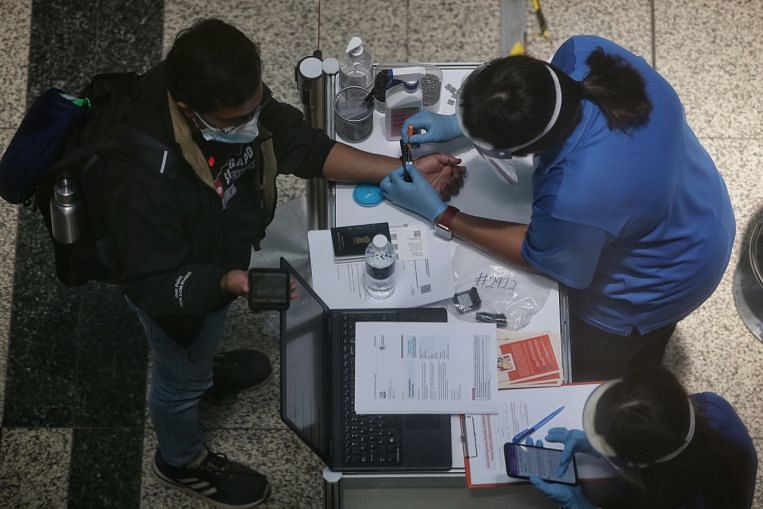
SINGAPORE - Requiring all travellers from India to be isolated for 21 instead of 14 days, would help strengthen Singapore's defences against a new double mutant variant that appears to be more infections, experts said.
But they added that it is not yet necessary to ban flights from India - as some countries have done - or tighten guidelines on social and other gatherings.
Singapore announced new safety measures on Tuesday, including fewer approvals for foreigners who are not permanent residents coming in from India, which is experiencing a second wave believed to be fuelled by a variant with a double mutation.
All travellers from India must now isolate for seven days at a residence after spending 14 days at a dedicated facility for those serving Stay-Home Notices (SHN)
"A 14-day quarantine or SHN would detect more than 98 per cent of Covid-19 cases, including those who were infected while on the plane," said Associate Professor Hsu Li Yang, the vice-dean of global health at the NUS Saw Swee Hock School of Public Health.
"A 21-day quarantine backed by specific tests would detect virtually all cases. However, that would impose a significant mental and financial cost" to the traveller.
The new measures have come amid a recent rise in locally-transmitted cases and as a new three-person cluster here has just been linked to a 43-year-old Indian national who was "probably reinfected" in India.
The work pass holder, who was asymptomatic, had tested positive on arrival from India on Apr 2 but was discharged after a few days as he was considered no longer infectious. But he went on to infect his sister-in-law and her husband.
Associate Professor Alex Cook, vice-dean of research from the same school as Prof Hsu, said the positive swab result could mean that he was infectious or had recently recovered from an infection.
A serology test to look for Covid-19 antibodies was then done and the man tested positive, meaning that he was infectious at least two weeks ago. But it is now clear that he could have been infected sometime back and then reinfected recently, and hence tested positive on both tests.
Prof Cook said that this shows that it's vital to assess the interpretation of the combination of a positive swab and serology tests, given that it can be a reinfection case, and continued vigilance is key.
India's surging outbreak has prompted places such as Hong Kong and New Zealand to ban flights.
Infectious disease expert Leong Hoe Nam said that while banning flights is easy, it is about achieving a balance, as there's also the need to support the economy and be compassionate in allowing family members to come to visit.
Flight bans provide just short-term relief, said Professor Teo Yik Ying, dean of the NUS Saw Swee Hock School of Public Health.
"If such flight bans were successful, we would have seen a much smaller Covid-19 footprint globally, given the number of flight bans and border closures in the early months of 2020," he said.
"What I suspect ... is that these new variants that have emerged in one country are in fact already circulating in other countries."
It's better to prevent virus variants from going on to seed uncontrollable community outbreaks with a comprehensive strategy that includes stricter border controls for travellers from India.
"This, together with the repeated testing that will be applied to such travellers, will greatly increase our ability to reduce any leakage into the community, such as what we have seen last week," said Prof Teo.
He added that the 14-day quarantine was never able to catch 100 per cent of the cases: "We know from the epidemiological data that there are people whose incubation period actually extends beyond 14 days, just that the chance of this happening is low."
Meanwhile, the Health Ministry is making easier for travellers from Hong Kong to come here as the Covid-19 situation there has improved. They will need to be isolated for seven days, instead of 14, and carried out their place of residence, if suitable.
"Ultimately, these are judgment calls based on data on the incubation period of the virus and the socioeconomic impact of longer Stay-Home Notices," said Prof Hsu.
Dr Leong added that as the virus adapts to human hosts, it will mutate and more cases can be expected here.
So, it boils down to "each and every one of us" doing our part, from using SafeEntry, TraceTogether to getting vaccinated, to create a robust, tight and effective block against the virus, he said.
https://news.google.com/__i/rss/rd/articles/CBMidWh0dHBzOi8vd3d3LnN0cmFpdHN0aW1lcy5jb20vc2luZ2Fwb3JlL2hlYWx0aC9hLTIxLWRheS1zaG4td291bGQtZW5hYmxlLWFsbC1jb3ZpZC0xOS1jYXNlcy1mcm9tLWluZGlhLXRvLWJlLXBpY2tlZC11cNIBAA?oc=5
2021-04-21 21:00:00Z
52781533252336
Tidak ada komentar:
Posting Komentar